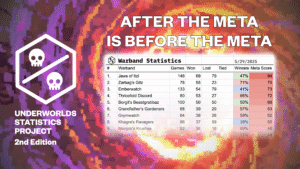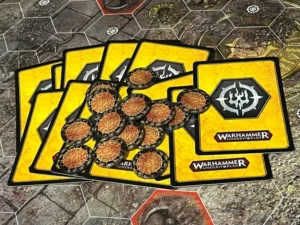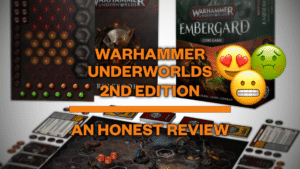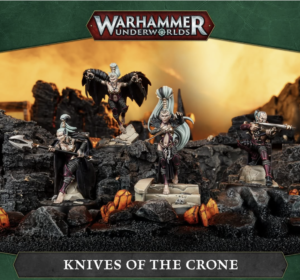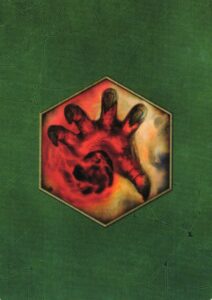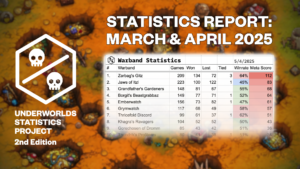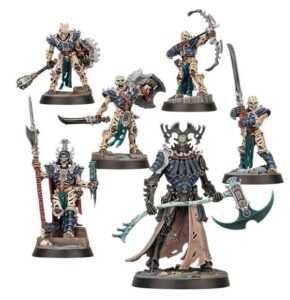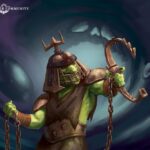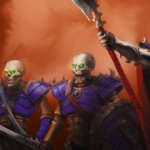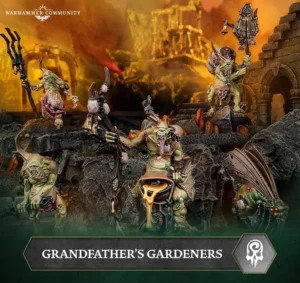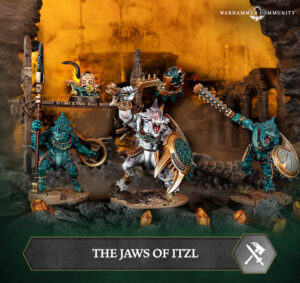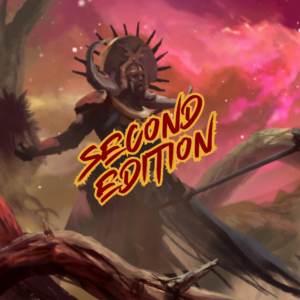Intro
Hello and welcome back for another serving of Bacon’s Bits, the article series where I get to dig into a niche Underworlds topic and weigh in with my opinion. For today’s discussion, I’ll be covering a topic that is very much not “new,” but something that I wanted to look at in a bit of a different lens. You see in online discussions, podcasts, and blog posts a lot of talk about playing to deny your opponent their scoring as much as you try to score for yourself. In fact, we talk about it on the podcast quite frequently! Identification of what your opponent is trying to do and the ways in which you might be able to stop them is the number one “next step” for a lot of players to take if they want to compete at the highest level of this game. I don’t want to get into a whole discussion about who the beatdown is again (see my article from 2022 if that is of interest), but rather, I’d like to focus just on where this supposed matchup knowledge is supposed to come from and the way it manifests itself on the table.
Gathering Data
It’s very hard for this discussion to not quickly devolve into “play games, git gud,” but I want to at least outline some ways you can best acquire the matchup knowledge required to implement some counterplay into your gameplan. There are two good angles for this and which you prefer will likely depend on the type of player you want to be.
The first is if you want to be that person who is the best at that one particular warband. You play this warband at every event and every online league and every pickup night at your FLGS. What this (hopefully) means is that you have a very deep understanding of what your warband can do. You know where the warband excels and where they are deficient. Fighter and board placement is practically something you could do in your sleep. You know which objective and power hands to keep or mulligan. You know exactly how to sequence certain cards to produce the desired effect on the game state. This is all great stuff and exactly the kind of thing you need to know if you want to win tournaments. However, for you to do so, you need to throw that warband and/or that deck you’ve built against a wide variety of matchups. Play it against aggro, flex, control, and HO warbands and see how it performs. And by this, I don’t mean “well Ironskull’s Boyz are an aggro warband, let me get some practice in against them.” I mean, you go out and see warbands like Madmob, GSP, Hexbane, all winning tournaments, so you grind those matchups for aggro. You see Domitan and Gorechosen landing podium placements, those are your control practice matches. The list goes on. Play your warband and your deck against these top meta threats and simply learn. Did your favorite board choice get punished in a longboard orientation, or did it let GSP in too quickly to eat you? Did you pick up on the fact that Hexbane just scored 4 glory in the first round because you killed two of their hunters and didn’t bother to get out of your own territory? These kinds of things will just require you to play into those matchups to learn. Maybe it takes 1 set to sink in, maybe it takes 20, but putting in the reps here will not only help your mastery of your own warband, but the matchups that you should expect to encounter. If you (accurately) identify some matchups as being easier for your warband, practice the harder ones more. This kind of approach, while certainly valuable in its own right and will be important in deciding what you want to play at an event, definitely does require significant time investment on your part, especially with the growing number of warbands in the game.
The second approach is actually my preferred option, and it revolves around playing with lots of different stuff rather than just mainlining a single warband. I’m not so oblivious as to think that I’m the only one who does this, but if you look at my tournament and league play history, you’ll see that I’ve played a remarkably varied set of warbands (though I do typically gravitate to warbands that have 5 or more fighters). Yes, there are some like Reapers or Clawpack that pop up quite frequently, but, for example, in this last run of the Vassal league, I switched my warband for every single week of the postseason. This is not to pat myself on the back or to give myself some kind of “challenge mode,” it’s simply to collect data for warbands that I am interested in and give me at least a baseline understanding of what they are trying to do, as well as to experiment with some interesting warband/deck pairings to see what feels good. While I eventually still have to settle down and pick a warband to get reps with that I want to bring to a tournament, I strongly believe that doing this sort of “survey” work first generally reduces the number of reps it takes to have a good understanding of the meta and how to play glory denial. In particular, you get that feeling while you’re playing of “oh man, it would really be annoying if my opponent did XYZ right now.” Well, now that you know that feeling, you know what your opponent might be thinking should they line up across from you in a game and have that warband themselves.
I don’t think either of these approaches is strictly better or worse than the other. In fact, I think that if you want to be really good at this game, you need to do a little of both. That being said, I do still think you get a lot more value and targeted usage out of the first approach if you start out by implementing the second.
Leveraging Data
So, now that we’ve spent a bunch of time learning, what does the outcome look like in practice? Well, the most notable thing that you will hopefully have gleaned is card knowledge. You’ll remember that certain warbands and/or Rivals decks might need to hold objectives in certain areas of the board, want your/their fighters in certain territories, need certain fighters alive, inspire if they achieve certain goals, etc. In theory, this knowledge should help you place boards/tokens/fighters and advise your play lines during the match. As I said at the outset, I don’t want to get too into the weeds of glory denial since we’ve already covered that discussion before, but suffice it to say that you’ve ideally got a plan when facing most of the meta-relevant warbands after having put in the work like this.
The not-so-obvious benefit to having all of this information in your head (even if it means you forget a birthday here or there…) is one that I would argue has more significantly impacted my tournament placings than even dice or matchup luck. That benefit is knowing when my opponent plays a card whether they are actually able to do so. I can’t tell you how many times in a tournament somebody has revealed an objective card to me saying that they’ve scored it, and I’ve corrected them and said “actually, you haven’t met condition XYZ on that card” or “oh, there’s actually an FAQ/errata on this card and it works like this instead.” Now, I feel I should clarify that I am not accusing anybody of cheating, far from it. I suspect that this has happened to everyone who has played the game in a competitive setting. WHU is complex and we are playing it on a timer at events, meaning it is easy to rush through and accidentally play a card in a manner inconsistent with how it actually works. Much like I will correct people if I catch their errors in this way, I appreciate people correcting me as well. While it is a point of pride for me that I feel I am more often doing the correcting rather than getting corrected, these completely innocent mistakes can have significant impacts on the game. If your opponent doesn’t score an end phase card, for example, not only is it denying them that glory, but also denying them the chance to cycle into additional cards. There’s nothing nefarious about correcting people, so don’t feel shy about it. Even if you are not sure whether they are playing something correctly, there’s no harm in saying “hey, would you mind if I took a look at that card real quick?” People are usually happy to oblige and, worst case, if you suspect they are playing it incorrectly, you can still call over the TO and ask for clarification. While you don’t want to be doing this frequently if you are unsure, it’s better for everyone if the game is played correctly. You get the benefit of your opponent not accidentally making things easier on themselves while your opponent doesn’t get a feeling of having “cheated” after the game for what is truly an honest mistake. While this might seem like a bit of a tangent, it is an aspect of “denial” play that is often overlooked and really opens up to you the more you know about different warbands/cards in the game. We’ve all had those moments playing against newer warbands where your opponent starts narrating the things they’re doing and you just kind of go along with it because you don’t know any better. Well, if you actually do know better, there are not many ways to help yourself that are more impactful than speaking up. I have found that the more intimate knowledge of a warband which comes with having played them myself opens up these potential corrections more frequently. It’s an aspect of playing the game that never shows up on the scoreboard, but I am convinced that it has both won and, in cases where I’ve missed things, lost me games. Even if you are playing against someone you generally consider to be “more knowledgeable” about the game than yourself, I encourage you to challenge them if you think something is being played incorrectly. Nobody is immune to making these errors (myself included) and this is a community where your opponent should generally be happy to correct their mistake and/or point you to the relevant rule/document that justifies the manner in which they are playing their card. Just to make sure the point drives home, I wanted to close out the discussion by saying to keep the conversation respectful when you make corrections. No reason to attack people for making mistakes, just calmly point out the error you believe has been made and 99% of the time it will get resolved with a very civil interaction.
Conclusion
Little bit of a different angle on how to play glory denial in Underworlds, but I hope you found it useful. I know it’s a bit funny to think about correcting someone’s mistake as a “strategy,” but honestly the impact really is that huge at times. While accuracy is critical here—you really don’t want to be the person who asks for clarification every time your opponent plays a card—it is a relatively simple thing you can do to up your game. I’m not advocating for memorizing the text on every card in the game (although, far be it from me to discourage any particularly motivated individuals who wish to do so), but playing with and/or against a wide variety of stuff really will help here. As with many Underworlds discussions, more games = get better at game, but I do think this is a pretty simple starting point that is often overlooked.
As always, thanks so much for reading and we wish you the best of luck on your journey—“um actually, it’s Path”—to Glory!



